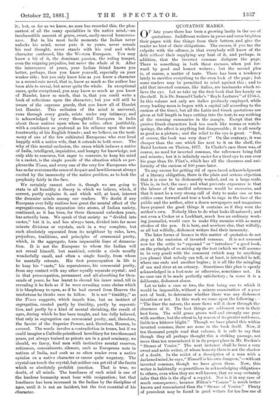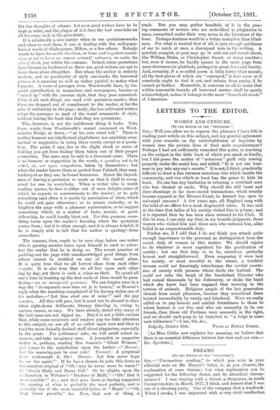QUOTATION MARKS.
OF late years there has been a growing laxity in the use of quotations. Indifferent writers in prose and verse brighten their pages with fine things from their betters, and give the reader no hint of their obligations. The excuse, if you tax the culprits with the offence, is that everybody will know of the debt without their supplying any hint of it, and perhaps, in addition, that the inverted commas disfigure the page. There is something in both these excuses, when put for- ward by good and honest writers ; but the second plea is, of course, a matter of taste. There has been a tendency lately to sacrifice everything to the even look of the page; but some readers may be permitted to rebel against this ; and to add that inverted commas, like italics, are landmarks which re- lieve the eye. Let us take up the first book that lies handy on the shelf. It is Dr. Samuel Clarke's "Boyle Lectures" of 1704-5. In this volume not only are italics profusely employed, while every leading noun is begun with a capital (all according to the custom of the time), but all the Latin and Greek quotations are given at full length in bays cutting into the text, to say nothing of the running summaries in the margin. Except that the cursive Greek characters look too much like worms or watch- springs, the effect is anything but disagreeable ; it is all nearly as good as a picture ; and the relief to the eye is great. " But, of course, the book was very dear r On the contrary, it was cheaper than the one which lies next to it on the shelf, the Baird Lecture on Theism, 1877. In Clarke's case there was, of course, no need for inverted commas, the references being full and minute ; but it is infinitely easier for a tired eye to run over his page than Dr. Flint's, which has all the closeness and uni- formity of the custom of 160 years later.
To any excuse for getting rid of open-faced acknowledgment of a literary obligation, there is the plain and serious objection that it is sure to be dishonestly worked, and on a large scale. This is, in fact, the case ; and what prevents exposures is that the labour of the needful references would be excessive, and that it must be a very strong call of duty to make one or two critics come forward and tear a book to rags in the face of the public and the author, after a dozen newspapers and magazines have praised the good things it contains as if they were the author's own. Nobody likes to do what looks ill-natured ; and not even a Croker or a Lockhart, much less an ordinary work- ing journalist, would care to make fifty enemies with as many strokes of the pen. It is here, and nowhere else, that wilfully, or all but wilfully, dishonest writers find their immunity.
The later forms of licence in this matter of quotation do not stop at the omission of inverted commas. It is not unusual now for the critic to " expound " or " introduce " a good book, on the principle of so mixing up the text (which we will assume to be very good) with the comment (which may be anything you please) that nobOdy can tell, or at least, is intended to tell, where one ends and another begins ; it is all like the mingling of sea and river at an estuary. Sometimes this plan is openly acknowledged in a foot-note or otherwise, sometimes not. In no case can it be made perfectly satisfactory ; in some it is a deliberate, dishonest abuse.
Let us take a case or two, the first being one to which it would be impossible, without a minute examination of a poor sort of book, to determine whether there was any dishonest intention or not. In this work we come upon the following :— " The finer the nature, the more flaws will it show through the clearness of it. The best things are seldomest seen in their best form. The wild grass grows well and strongly one year with another; but the wheat is, by reason of its greater nobleness, liable to a bitterer blight." Though we have placed this within inverted commas, there are none in the book itself. Now, if ten thousand people read that volume, it is safe to say that though they all perhaps thought this a striking passage, not more than ten remembered it in its proper place in Mr. Ruskin's " Stones of Venice." The next instance shall be from a very sweet and noble writer, of whose honesty there is not the shadow of a doubt. In the midst of a description of a man with a darkened mind, he says," Himself is his own dungeon,"—without inverted commas, though we have given them. Now, this writer is habitually so punctilious in acknowledging obligations to others, even when they are well known, that we may certainly infer that this is the slip of a copyist. Nor is it in any case of much consequence ; because Milton's " Comus " is much better known and remembered than the " Stones of Venice." Plenty of precedent may be found in good writers for too free use of
the fine thoughts of others ; bat even good writers have to be kept in order, and the plague of it is that the bad ones take an ell for every inch in the precedents.
It is admittedly a nice matter when to use quotation-marks and when to omit them, if one is dealing with the well-popu- larised words of Shakespeare, Milton, or a few others. Nobody wants to have damnable iteration, or lame and impotent conclu- sion, or not to know me argues yourself unknown, or 'Under the ribs of death, put within the commas. Indeed, when quotations have become as hackneyed as these are, good writers are apt to leave them alone altogether. But where the author is entirely modern, and no peculiarity of style ear-marks the borrowed phrase, it is amusing as well as rather painful to notice what happens. A score of passages from Wordsworth have, by fre- quent reproduction in magazines and newspapers, become so
mixed up " with the yeoman style, that they pass unnoticed. First of all, such things are used with quotation-marks ; then these are dropped, out of compliment to the reader, or for the sake of uniformity in the page ; lastly, the less cultivated writers adopt the passages as part of the Usual ornaments of style, without having the least idea that they are quotations.
This, however, is not the indifferent thing it looks. Take these words from Wordsworth's sonnet composed on West- minster Bridge at dawn,—" at his own sweet will." There is neither humour nor intellectual playfulness. nor anything orna- mental or suggestive, in using these words, except as a quota- tion. The point, if any, lies in the slight shock or sense of tickling you get from finding them taken out of their proper connection. The same may be said in a thousand cases. There is no humour or suggestion in the words, a question not to be asked, or, not upon compulsion, taken by themselves ; but when the reader knows them as quoted from Falstaff, they may, hackneyed as they are, be found humorous. Hence the import- ance of having a quotation so made as that it shall be recog- nised for one by everybody. When a writer who is worth reading quotes, he does it either out of mere delight (some of which he expects to communicate to the reader), or to gain something (and often it is much) by association of ideas, which he could not gain otherwise ; or to arouse curiosity, or to brighten the page with a pleasant equivocation, or to suggest something which, as a matter of taste, morals, or good- fellowship, he could hardly blurt out. For this purpose, some- thing turns upon the reader's knowing where the quotation comes from ; but it is often enough, and it is always helpful, if he is simply able to tell that his author is quoting—from somewhere.
The reasons, then, ought to be very clear, before one writer who is quoting another takes upon himself to omit to adver- tise the reader that he is doing so. The recent practice of padding-out the page with unacknowledged good things from others cannot be justified on any of the usual pleas. It is quite true that we all borrow ideas from each other —quite. It is also true that we all live upon each other day by day, yet there is such a crime as theft. To spend all one's time in bunting up the first seeds of ideas would be para- lysing,—on ne mangerait personae. We can forgive once in a way the " Je reprends mon Bien ou je le trouve," or Rossini's reply when the musician complained of his having stolen one of his melodies,—"- Let him steal one of mine !" said the gay maestro. All this will pass, but it must not be abused in days when right-down deliberate literary thieving is, owing to various causes, so easy. We have already stated why many of the bad cases are not ripped up. But it is not a little curious that, while some reviewers and readers pay too little attention to this subject, we are all of us called upon now and then to read the most finically devised stuff about plagiarism, especially in the poets. For politeness' sake, we will avoid actual in- stances, and take imaginary ones. A journalist or magazine writer is, perhaps, reading Ben Jonson's " Silent Woman," and comes to the malediction upon the barber :—"Morose: Let his warming-pan be ever cold ! Truewit : A perpetual frost underneath it, Sir ! Morose : Let him never hope t I see fire again !" if he has a chance, he puts this down as the manifest original of " Oh ! may he never more be warm !"
in Goody Blake and Harry Gill." Or he alights upon the exclamation in Webster's " Duchess of Malfi,"—" Oh ! that it were possible !" &c. ; and that goes down as having suggested the opening of what is probably the most pathetic, and is certainly one of the most beautiful lyrics, in " Mand,"—" Oh, that 'twere possible," &c. Now, that sort of thing is trash. But you may gather handfuls of it in the pass- ing comments of writers who are mole-blind to plagiarism in mass, committed under their very noses in the literature of the hour. Perhaps deafness would be a better metaphor than blind- ness. For what is wanted first of all, is just enough quickness of ear to catch at once a discrepant note in the writing. A novelist, essayist, or poet may go in and out and round about,. like William Blake, or Christopher Smart, or many another ; but, even if insane, he hardly passes in the same page from mere cleverness (or platitude, perhaps) to great force and beauty. And, certainly, if a so-called poem is little better than mosaic,. all the best pieces of which are "conveyed," it does seem as if somebody ought to find it out, and refrain from praise, if he cannot go farther. Meanwhile, it concerns us all to insist that within reasonable bounds all borrowed matter shall be openly acknowledged, unless it belongs to the mere " household words"' of Literature.



































 Previous page
Previous page